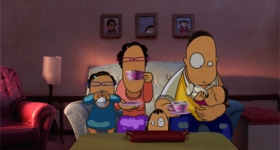In this article, Tang says that Allen's recent streak of critical and commercial flops may be attributable to the fact that he doesn't represent Soon-Yi in any of his films. His wife is Asian but the heroines and love interests of his films are distinctly European-looking like Scarlett Johansson, who has starred in three of Allen's films since 2005. Asian muse at home + white muse on the screen = Muddled final film.
Tang suggests that Allen replace his white leading women with Asian American actresses.
I'm all for more diversity on screen, and I do think that Allen's white casting preferences are limiting the potential for his films' success. But perhaps Allen strays from that type of casting because thus far his association with Asian Americans has been...creepy.
If anything, he's trying to look like less of a perv with a penchant for young Asian women by consistently featuring white actresses in his films.
Allen has always been Eurocentric in his casting, even before Soon-Yi. She may be the love of his life, but I don't know how much that relationship — or her ethnicity — affects his desire to tell stories using non-whites. The only notable characters played by people of color in Allen's films that I can recall is Nigerian-English actor Chiwetel Ejiofor's role in 2004's Melinda and Melinda.
I think his flop-rate has more to do with his inability to be relevant in 21st century filmmaking. His older fans don't like that his current films fail to match up to his "Annie Hall" days and younger film-goers don't quite relate to his version of New York (though he's branched out to London and Barcelona in recent films) which is still kind of old, rich and white. His characters get younger, but that Woody Allen-ness is still there which, these days, is now a bit anachronistic. And it's not that he can't feature a diverse group of actors in his films; I just don't think he wants to, Asian wife or no Asian wife.
This blog entry is graciously sponsored by Toyota Matrix. Check out their website dedicated to the best in Asian American film.











Comments